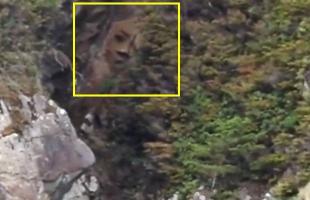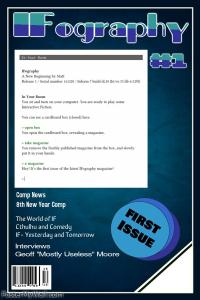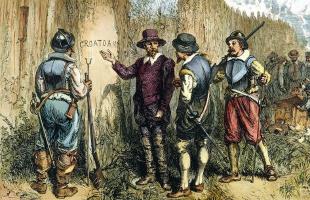Copy Link
Add to Bookmark
Report
Computer Undergroud Digest Vol. 10 Issue 50

Computer underground Digest Sun Oct 11, 1998 Volume 10 : Issue 50
ISSN 1004-042X
Editor: Jim Thomas (cudigest@sun.soci.niu.edu)
News Editor: Gordon Meyer (gmeyer@sun.soci.niu.edu)
Archivist: Brendan Kehoe
Shadow Master: Stanton McCandlish
Shadow-Archivists: Dan Carosone / Paul Southworth
Ralph Sims / Jyrki Kuoppala
Ian Dickinson
Field Agent Extraordinaire: David Smith
Cu Digest Homepage: http://www.soci.niu.edu/~cudigest
CONTENTS, #10.50 (Sun, Oct 11, 1998)
File 1--CuD Publication Delay Explained
File 2--error message haiku
File 3--Islands in the Clickstream. Getting Real. September 19, 1998
File 4--(fwd) ALAWON, #7/105 - ALA ARGUES AGAINST FED FILTERS
File 5--SLAC Bulletin, September 20, 1998
File 6--Comment on House Resolution 525
File 7--Pentagon cuts back its Internet data
File 8--CA anti-spam Bill
File 9--Defamation Suit against pro-union site
File 10--Cu Digest Header Info (unchanged since 25 Apr, 1998)
CuD ADMINISTRATIVE, EDITORIAL, AND SUBSCRIPTION INFORMATION ApPEARS IN
THE CONCLUDING FILE AT THE END OF EACH ISSUE.
---------------------------------------------------------------------
Date: Sun, 11 Oct 1998 12:28:44 -0500 (CDT)
From: Computer underground Digest <cudigest@SUN.SOCI.NIU.EDU>
Subject: File 1--CuD Publication Delay Explained
Many of you have asked about CuD's quiescence over the past four
weeks. All is well. Time crunches, a few pressing deadlines, and a
heavy teaching schedule ate up a month.
There are quite a few posts in the chute, and we'll try to run
them all. So, a few of the "Date:" lines will be a bit old. We
hope to be back on schedule within a week or two.
jt
------------------------------
Date: Tue, 8 Sep 1998 17:03:39 -0700 (PDT)
From: Phil Agre <pagre@weber.ucsd.edu>
Subject: File 2--error message haiku
((MODERATORS' NOTE: Last issue, we printed some computer
Haiku that we rec'd from an unknown poster. Thanks to Phil
Agre for pointing us to the original source)).
The origin of the error message haiku is:
http://www.salonmagazine.com/21st/chal/1998/02/10chal2.html
You might want to acknowledge them.
Phil Agre
------------------------------
Date: Mon, 21 Sep 1998 15:32:30 -0500
From: Richard Thieme <rthieme@thiemeworks.com>
Subject: File 3--Islands in the Clickstream. Getting Real. September 19, 1998
Islands in the Clickstream:
Getting Real
The themes of the digital world often involve fantasy and reality,
illusions and truths, game-playing and "getting real." In cyberspace, we
traffic in abstractions, digital images and symbols that represent printed
text - these words, for example - which represent writing which represents
speech which represents thoughts and affective states. These images become
as fixed in our memory as photographs once were "fixed" in a chemical
solution. We mistake our representations for the "real thing," the truth of
our own experience, which devolves into an elusive, mythical being like a
unicorn or the firebird.
Recent studies suggest that many complex organisms - not just human beings
- represent the world to themselves. This is easier to visualize when we
think of monkeys, for example, always using one sound to mean "danger in
the sky" and another to mean "danger on the ground." Our nervous systems
seem to have evolved so we can present to ourselves those representations
of streaming photonic data that we call "experience." But when we live in a
world that is more manufactured than remembered, a world that simulates
simulations like computers making recursive calls, it becomes increasingly
difficult to know whether we have really experienced something - or not.
And yet at the highest level of our experience, we do know when we are
being real.
I am often a guest on a local radio program hosted by Jean Feraca, an
interviewer so accomplished after a dozen years of doing it ten hours a
week for Wisconsin Public Radio that her crafty artfulness has dissolved
into her technique. She creates a context effortlessly that invites her
guests to be forthcoming, anticipating the directions of their thinking
intuitively so she can lead them to the next paragraph.
Today we spoke about the "outing" of humanity by the digital world, the
difficulty of engaging in civil discourse when we all know whatever there
is to know about everybody else.
The presupposition of the conversation was, of course, the President's
recent humbling. Now, separate from the details of the situation, some
people hate our American President the way others hated Roosevelt or Nixon,
with a lacerating visceral rage. One caller railed at his improprieties and
demanded punishment. "Don't you think," he said, "there should be
consequences for this kind of behavior?"
It seems to be the nature of cause-and-effect in the moral domain that
there ARE consequences whether I think there ought to be or not, of which
the President's prolonged ordeal is one obvious example. Bill Clinton is
reaping a whirlwind and his life is soaked with the anxious perspiration of
public humiliation. But the caller wanted more. He wanted blood.
Now, I was immersed for years in people's lives at a deep, intimate level
as a parish priest, and I learned that we judge and vilify most the things
we have done or think of doing. We "whip the whore," as Shakespeare said,
while lusting for her body. And when we do, our self-righteous anger has a
tone of voice that is unmistakable.
When we stop attacking, however, and tell the truth about ourselves
instead, the tone of voice changes. It becomes softer more self-effacin=
g,
more real.
All I could ask was, what in the world had the caller done? what real or
imagined guilt fueled his pitiless fury?
I didn't expect a confession on the air. But there might have been a pause.
There might have been that blessed hesitation that discloses that we have
become conscious of our own history in a way that tempers our
vindictiveness. When that happens, our voices downshift, and we speak from
a deeper awareness that the truth includes the rest of us as well as the
one we assailed. And when we do, it does. Others are welcomed back into
humanity instead of demolished.
Civil discourse can't happen without that level of self-knowledge. It's as
true of public debate as a disagreement in a marriage. Political discourse
does not need to emulate a twelve step meeting in order for the
conversation to get real. The details do not need to be part of the
dialogue, just the deeper self-knowledge that includes others in the
conversation as well as ourselves.
Digital symbols, like all abstractions of our experience, are neutral. They
simply reflect and refract the truth of our lives. We human beings radiate
information all the time. We can't help it. A good observer can spend ten
minutes with someone and discern the essential truth of their lives. A few
words and gestures does it all. The truth of our lives begins at the core
of our experience and being, and however we obscure or disguise that core,
it wants to be known. It wants to declare itself to the world, and when it
does, the barriers created by our prideful posturing vanish. Whether speech
or writing or digital typing, all the levels of abstraction collapse into a
single point as if we had jerked the drawstring of a purse.
By "getting real," we mean that we speak with humility because we speak
first from the truth of ourselves. When we know who we are, we can see
clearly who others are. Then we can speak of accountability and compassion
in the same tone of voice.
The digital world is transparent. Every key I hit declares who I am. The
digital world is a Big Toy made up of video and audio and morphing
animations which all collapse into light and color when we speak from the
heart. The media with which we try to hide ourselves become a magnifying
glass for all that we are.
"Truth" is a dangerous word. It all depends who says it and how. The real
truth is what it always was. And the truth can be said or sung by any
voice, any time, any where. In that moment, we break into an invisible
communion, and our digital words becomes law in the world because they're
congruent with the deeper truth and our larger life.
**********************************************************************
Islands in the Clickstream is a weekly column written by
Richard Thieme exploring social and cultural dimensions
of computer technology. Comments are welcome.
Feel free to pass along columns for personal use, retaining this
signature file. If interested in (1) publishing columns
online or in print, (2) giving a free subscription as a gift, or
(3) distributing Islands to employees or over a network,
email for details.
To subscribe to Islands in the Clickstream, send email to
rthieme@thiemeworks.com with the words "subscribe islands" in the
body of the message. To unsubscribe, email with "unsubscribe
islands" in the body of the message.
Richard Thieme is a professional speaker, consultant, and writer
focused on the impact of computer technology on individuals and
organizations.
Islands in the Clickstream (c) Richard Thieme, 1998. All rights reserved.
ThiemeWorks on the Web: http://www.thiemeworks.com
ThiemeWorks P. O. Box 17737 Milwaukee WI 53217-0737 414.351.2321
------------------------------
Date: Mon, 14 Sep 1998 22:25:00 -0400
From: Jonathan Wallace <jw@bway.net>
Subject: File 4--(fwd) ALAWON, #7/105 - ALA ARGUES AGAINST FED FILTERS
From--"ALAWASH E-MAIL (ALAWASH E-MAIL)" <ALAWASH@alawash.org>
___________________________________________________________
ALAWON Volume 7, Number 105
ISSN 1069-7799 September 14, 1998
American Library Association Washington Office Newsline
In this issue: (91 lines)
ALA ARGUES AGAINST FEDERAL REQUIREMENTS ON
INTERNET FILTERING BEFORE
HOUSE SUBCOMMITTEE ON TELECOMMUNICATIONS
______________________________________________________________
ALA ARGUES AGAINST FEDERAL REQUIREMENTS ON INTERNET FILTERING
BEFORE HOUSE SUBCOMMITTEE ON TELECOMMUNICATIONS
On Friday, September 11, Agnes M. Griffen, a member of the ALA
Committee on Legislation, testified on behalf of ALA before the
House Subcommittee on Telecommunications. The hearing, chaired
by Rep. Michael Oxley (R-OH), focused on "Legislative Proposals
to Protect Children from Inappropriate Materials on the
Internet."
Griffen spoke as a working librarian on the practical as well as
philosophical issues that many librarians have with the use of
blocking and filtering software. ALA's testimony emphasized that
the decision whether to employ blocking and filtering software
should be made by the local communities through library boards
and schools boards, not the federal government.
Two of the bills under discussion at the hearing were H.R. 3177,
the Safe Schools Internet Act of 1998, and the "Istook"
amendment, currently attached to H.R. 4273, the Labor/HHS
appropriations bill. H.R. 3177, sponsored by Rep. Bob Franks
(R-NJ), would require all schools and libraries receiving e-rate
discounts on telecommunications to install filtering or blocking
software. Sen. McCain (R-AZ) has sponsored a similar provision
now included in S. 2260, Commerce, Justice, State Appropriations.
Franks testified in favor of his bill at the hearing.
Rep. Ernest Istook (R-OK) testified in favor of his amendment
which would require filtering software for any library or school
receiving federal funds to purchase computers. Others testifying
at the hearing included Sen. Dan Coats (R-IN) and Stephen R.
Wiley, Chief of the FBI's Violent Crimes and Major Offenders
Section, which investigates online crimes against children.
Griffen, director at the Tucson-Pima Public Library in Arizona,
testified on the third and final witness panel which included:
Jerry Berman, director of the Center for Democracy and
Technology, Mr. Lawrence Lessig, professor of law at Harvard
University, and Peter Nickerson, CEO of N2H2, a producer of
server-based filtering software. Also asked to testify by the
House subcommittee was Jeffrey Douglas, executive director of the
Free Speech Coalition, a trade association for providers of
online adult entertainment. Other witnesses on the panel
described adult-verification systems and types of filtering
software. A psychiatrist also testified about the detrimental
affects of pornography and the risks of becoming a "porn addict."
The invitation to testify came only late on Wednesday, September
9. Working in conjunction with the ALA Washington Office and the
Office for Intellectual Freedom, Griffen and ALA staff were able
to prepare testimony as well as clear schedules and make
arrangements for Griffen to get to Washington on such short
notice.
Based upon this hearing, there may be an attempt to draft an
"amalgam" bill on filtering for consideration by the House before
this session of Congress ends in early October. There is little
time for such an effort. ALAWON will bring you more information
if and when it becomes available.
____________________________________________________________
ALAWON is a free, irregular publication of the American Library
Association Washington Office. To subscribe, send the message:
subscribe ala-wo [your_firstname] [your_lastname] to listproc
@ala.org. To unsubscribe, go to http://www.ala.org/washoff/
subscribe.html or send the message: unsubscribe ala-wo to
listproc@ala.org. ALAWON archives at http://www.ala.org/
washoff/alawon. Visit our Web site at http://www.alawash.org.
ALA Washington Office 202.628.8410 (V)
1301 Pennsylvania Ave., NW, #403 202.628.8419 (F)
Washington, DC 20004-1701 800.941.8478 (V)
Lynne E. Bradley, Editor <leb@alawash.org>
Deirdre Herman, Managing Editor <alawash@alawash.org>
Contributors: Carol C. Henderson
Lynne E. Bradley
Claudette W. Tennant
All materials subject to copyright by the American Library
Association may be reprinted or redistributed for noncommercial
purposes with appropriate credits.
------------------------------
Date: Sun, 20 Sep 1998 11:27:57 GMT
From: jw@bway.net
Subject: File 5--SLAC Bulletin, September 20, 1998
SLAC Bulletin for September 20, 1998
-----------------------------------------
The SLAC Bulletin is a series of updates to Jonathan
Wallace's and Mark Mangan's Sex, Laws and Cyberspace
(Henry Holt 1996), on Internet freedom of speech.
You can subscribe to (or delete yourself from) the
SLAC list at http://www.greenspun.com/spam/home.tcl?domain=SLAC
THE INDECENT STARR REPORT
By Jonathan Wallace
jw@bway.net
The Starr Report, which the Republicans in Congress rushed to the
Web, clearly would have qualified as "indecent" under the plain terms of the
Communications Decency Act. Ironically, many of the politicians
who voted for the CDA also voted to post the Starr Report on the Web.
In the report, we are treated to a number of explicit accounts,
of which the cigar incident is the most memorable. I certainly know more
now about our President's philosophy of sexual relations than I would ever
have wished to.
Why does the Starr Report belong on the Web? It seems to me there
are only two ways to categorize this material. It may be purely prurient,
and therefore a gross invasion of the President's privacy. In this
case, it was placed on the Web only by the pure malice of the President's
adversaries.
On the other hand, the Starr Report may give crucial insight into
the question of whether President Clinton can be trusted to perform the
duties of his office. If this is so, then Congress had a duty
(which I'm sure was exercised with a heavy heart) to make this
material available to the American people.
The CDA would not have drawn any distinction:
under its plain language, the report was indecent in any event.
The act defined indecency as the
depiction or description of sexual or excretory acts or organs in a
patently offensive fashion. It notably did not add: unless that
depiction or description has significant scientific, literary,
artistic or political value. The Supreme Court held the CDA
unconstititional precisely because it would criminalize Web pages
pertaining to AIDS, safe sex, the Holocaust---and the sexual antics
of presidents.
Is the Starr Report "patently offensive" under the CDA's definition?
Clearly it is, to someone---in fact, more than a few someones. The howls
of execration directed at the President from certain quarters prove that both
the underlying behavior, and the description of it in the report, disgust
many Americans.
Publication of the Starr report on the Web confirms that public
discourse will sometimes include matters unfit for the mind of a small
child. This has always been true. How do you deal with it? There are
two theories. Either you eliminate the offensive speech from the world,
or you supervise the child. Social conservatives have always been in favor
of the former, and so was Congress when it passed the CDA.
The Supreme Court has held many times, from 1957's Butler v.
Michigan through the CDA case, that you cannot reduce adults to
reading only what is fit for children. But this is precisely what
the CDA would have done.
After the CDA failed, the pro-censorship troops concentrated their
efforts on mandating the use of blocking software (censorware) in public
schools and libraries. If they succeed in forcing a widespread enough adoption
of censorware, they will have brought back the CDA through the back door.
Three censorware products, Bess, Smartfilter, and Cybersitter,
immediately added the Starr report to their blacklists. Each of these
is in use in schools and libraries. In the Lakeview, Ohio
high school, the journalism class requested the removal of Bess
because it prevented the students from doing writing assignments on
AIDS and teenage drug use. Smartfilter was adopted by
Utah---in that state, adult patrons of some libraries are now
unable to get the Starr report.
If the Starr Report is a matter of public importance and
deserves consideration in our discourse, it should be accessible, in every
library. If not, Congress shouldn't have put it on the Web in the first
place.
Congress can't have it both ways.
------------------------------
Date: Sun, 13 Sep 1998 22:31:02 -0500
From: cudigest@SUN.SOCI.NIU.EDU(Computer underground Digest)
Subject: File 6--Comment on House Resolution 525
It struck me as darkly ironic that the very House Members who've
been so vociferous in their efforts to censor the Net,
practically tripped over themselves in a headlong rush to
Web-publish the Starr Referral/Report, despite a torrent of
advance leaks that it contained graphic, lurid detail of sexual
high jinks.
House Resolution 525, presented by 1995 CDA supporter and Rules
Committee Chairman Gerald Solomon [R-NY], was devoid any hint of
concern about releasing its content on the Web...without even so
much as a parental warning.
Nor was there a single suggestion during the floor debate that it
might a good idea to include a cautionary note or PICS meta
tags...not even from Rep. Bob Franks [R-NJ], sponsor of HR 3177,
the so-called `Safe Schools Internet Act of 1998,' which mandates
the installation of filtering programs by all federal funds
recipient schools and libraries providing Net access.
Instead, the 450-plus pages were simply released exactly as
received from the independent counsel's office, in all their
seamy, salacious and voyeuristic glory...sans warnings, sans any
attempt whatsoever to help guard against curious prepubescents
taking in every pornographic word.
Could it be that, along with "high crimes and misdemeanors," the
terms "objectionable material" and "freedom of speech" are now
coming to mean only what the House finds it convenient to say
they mean on any given day?
Or is it just that the word "hypocrisy" is still defined
precisely as it always has been?
------------------------------
Date: Sat, 26 Sep 1998 08:15:04 -0700
From: Jim Galasyn <blackbox@bbox.com>
Subject: File 7--Pentagon cuts back its Internet data
Pentagon cuts back its Internet data
September 26, 1998
http://www.phillynews.com/inquirer/98/Sep/26/national/PENT26.htm
By Laura Myers
ASSOCIATED PRESS
WASHINGTON -- The Pentagon, fearing that national security was
being compromised, ordered sensitive information pulled yesterday
from its Internet sites, including troop movements, weapons
development, Social Security numbers, and reviews that could
reveal secrets to adversaries.
The Defense Department's 1,000 publicly accessible World Wide Web
sites may be stripped down further by year-end after a
Pentagon-wide review of data being put in cyberspace.
Deputy Defense Secretary John Hamre, who ordered the review, said
he recently became aware that some Web sites were offering "too
much detail on DOD capabilities, infrastructure, personnel and
operation procedures."
................
The Pentagon has been using the Internet to spread information to
members of the military serving around the world, partly to speed
up business and eliminate paperwork for contracts and
administration. It also said it was aiming to be more open with
Americans and the international community.
Hamre said the goal now was to manage the Web sites more closely
and "to strike a balance between openness and sound security."
Enemies of the United States such as terrorists, adversarial
governments, members of organized crime, and drug traffickers
probably found the Pentagon sites a treasure trove of useful
information, said E. Peter Earnest, president of the Association
of Former Intelligence Officers, who worked for the CIA before
retiring.
................
Some hackers have not been satisfied with the Pentagon's open Web
sites and have tried to get into some of the department's 2.1
million computers. In February, Hamre said the Pentagon's
unclassified computers were hit by the "most organized and
systematic attack" to date, targeting mostly personnel records.
Last year, hackers penetrated medical data banks at veterans
hospitals and changed blood types in soldiers' records, according
to Federal Computer Week magazine, which quoted Art Money, a
civilian awaiting nomination as assistant defense secretary for
communications and intelligence.
------------------------------
Date: Thu, 24 Sep 1998 15:20:36 -0700 (PDT)
From: Lisa Mann <lisam@oreilly.com>
Subject: File 8--CA anti-spam Bill
For Immediate Release
For more information, a review copy of "Stopping Spam",
photos, or an interview with the authors, contact:
Lisa Mann (707)829-0515 ext. 230 lisam@oreilly.com
Will HR 3888 nullify California's pending Internet Consumer
Protection Act?
On August 28, 1998, The California Senate and Assembly approved a
bill--The Internet Consumer Protection Act (California Assembly Bill
1629)--that would make it illegal to send e-mail using a forged domain
name, and would allow Internet service providers (ISPs) to take
spammers to court.
"AB 1629 sends a clear message that California stands behind Internet
Service Providers who prohibit their users from spamming." said Alan
Schwartz, computer security expert and author of the upcoming book,
"Stopping Spam", "AB 1629 is a powerful tool for ISPs to enforce their
acceptable use policies against spamming by seeking substantial
monetary redress against violators. The California bill states that it
will become void if federal legislation is passed on the topic, so
whether or not HR 3888 intends to preempt state legislation, it reads
to me like it would de facto preempt the California bill." said
Schwartz.
First introduced in January, the California bill was written by
Assemblyman Gary G. Miller (R-Diamond Bar) and co-sponsored by
Assemblyman Jim Cunneen (R-San Jose) Under the bill, California ISPs
may publish a notice forbidding the use of their equipment to send or
deliver spam. They may sue anyone who violates this for $50 per message
up to $25,000 per day in which the spamming takes place, or actual
damages. Attorneys' fees are also recoverable. In addition, under this
bill, the unauthorized use of domain names in electronic mail may
result in a fine of up $5,000 and/or imprisonment for up to a year. It
now must be signed by the governor. AB 1629 is expected to go into
effect in September.
In a press release, Assemblyman Gary Miller said "I am all for free
speech, but it should be illegal to take someone's computer hostage
with junk email. Even before I introduced AB 1629, the interest from
Internet users and businesses to place some curbs on spam was
overwhelming. There is a real sense of urgency to find a solution to
this growing problem." The bill is supported by CAUCE (the Coalition
Against Unsolicited Commercial E-mail), Junkbusters, FREE (the Forum
for Responsible and Ethical E-mail), ISP/C (the Internet Service
Providers Consortium), and various other organizations.
AB 1629 is threatened by U.S. H.R. 3888 (the Anti-slamming Amendments
Act), which, should it pass in its present form, could pre-empt all new
state junk e-mail legislation. HR 3888, authored by Rep. Tauzin
(R-Louisiana), would legalize any spam that is labeled as unsolicited
commercial email. Ray Everett-Church, Co-Founder and Counsel CAUCE, in
an open letter to Chairman Tauzin, wrote: "The preemption of any future
state laws relating to unsolicited commercial email is extremely
dangerous for ISPs and consumers. Nearly a dozen states are considering
laws regarding UCE and this bill would invalidate them. One bill
pending in California, for example, would assure ISPs the right to
enforce their service agreements, even against those who send UCE in
violation of stated contractual terms...as currently written, a state
statute which would give an ISP the right to enforce anti-spam
provisions would appear to be preempted by H.R. 3888."
"The average person is probably aware of what personal inconvenience
spam is but doesn't often consider that this inconvenience multiplied
by another couple million people is going to cause a lot of trouble
going to be for the system and the people who keep the system running
as a whole," said Schwartz. "The problem is only getting worse. People
need to fight back, and supporting anti-spam legislation is one of the
methods we suggest in "Stopping Spam.'"
------------------------------
From: "Terry Lefebvre" <clacattack@wutzon.com>
Subject: File 9--Defamation Suit against pro-union site
Date: Sat, 3 Oct 1998 21:25:55 -0700
Please excuse this intrusion. The following may be of interest to
you and your collegues in regards to a defamation suit on the
Internet. Due to the variety of implications regarding the ability
of the common man to reveal basic truths and stand up for certain
principles i.e. freedom of speech, civil liberties, solidarity and
challenge the laws of libel and defamation. You are invited to
review and comment on the current litigation in process. The
following has been sent or forwarded to a large number of Labour
organizations requesting support and assistance.
Ladies and Gentlemen, I am appealing for Union Support and
Assistance in regards to my website being sued for defamation by
the Christian Labour Association of Canada. In that I had
personally been affected by their manner of business, I took it
upon myself to research and subsequently compile information that
has allegedly been detrimental to them. The following quotes are
in my belief both credible and worthy of dissemination and appeal
for support in maintaining a web presence based on these truths.
"CLAC is not a real union," said Mary Rowles, a spokeswoman with
the CLC (Canadian Labour Congress). "Their reputation is that
they're a company union, invited in by companies to create
sub-standard agreements that act as a shield to keep out real
unions."
"OPEIU Local 378 - They are employer dominated organizations that
do not represent the interests of their members in any way shape
or form. Please do not post any information here dealing with
this trash."
"As a union member of a real "Union" CAW Canada. I find this whole
situation disturbing and disgusting. It is already hard enough to
organize in todays anti union ontario without a right wing fringe
group pretending to be a union."
John Bowman national representative CAW "Given a free choice
workers will be less likely to voluntarily join an inferior
sectoral agreement with little or no service. We believe this is
the most effective foil for employer dominated organizations such
as CLAC and their like."
IWA.."We must make it our mission to rid this country of this
bogus organization"
Labour Relations.."The seemingly undemocratic way in which Mr.
Vanderlaan " who the board found to be a less than credible
witness"..entered into the purported "collective
agreement"...while having total disregard...raises some serious
concerns as to the status of this organization as a union"
Boilermakers Union "My mission is to prove to the rest of the
working world that CLAC is an excuse to syphon money from working
people in order to further supress them through lobbying labour
legislation (WRF) and to support only the political candidates
that hold their decree (Reformers). "
United Brotherhood of Carpenters Joiners and Allied
Workers"if you and others keep up the attack on CLAC and more come
forward we might have their true colours exposed."
Anticlac Former Univision Employee.."They were so nice at first, I
can hardly believe how they treated us later. CLAC promised us
Christian principles, they gave us the Judas treatment, betrayal,
treachery, deceit and neglect."
Progressive Calvinism League "Why does the CLA fail to operate
where its duty is the plainest, namely, in a case where the
exploitation is the worst? The answer is, we believe, that it
will be unpopular for the CLA to organize a union which will
result in costing the members of the Christian Reformed church
some money."
Please take the time to visit this site and review
it's contents. Appreciate any and all assistance and support in
this matter. Please forward this message to anyother
organizations who you feel would benefit. This is a onetime
mailing. Your email address was manually extracted from a variety
of Inet concerned websites.
Terry Lefebvre
45744 Webb Ave. Chilliwack, B.C. V2R 4E4
1-604-824-0927
1-604-858-0548
fax 1-604-858-0577^
www.wutzon.com/clac^
clacattack@wutzon.com^
------------------------------
Date: Thu, 25 Apr 1998 22:51:01 CST
From: CuD Moderators <cudigest@sun.soci.niu.edu>
Subject: File 10--Cu Digest Header Info (unchanged since 25 Apr, 1998)
Cu-Digest is a weekly electronic journal/newsletter. Subscriptions are
available at no cost electronically.
CuD is available as a Usenet newsgroup: comp.society.cu-digest
Or, to subscribe, send post with this in the "Subject:: line:
SUBSCRIBE CU-DIGEST
Send the message to: cu-digest-request@weber.ucsd.edu
DO NOT SEND SUBSCRIPTIONS TO THE MODERATORS.
The editors may be contacted by voice (815-753-6436), fax (815-753-6302)
or U.S. mail at: Jim Thomas, Department of Sociology, NIU, DeKalb, IL
60115, USA.
To UNSUB, send a one-line message: UNSUB CU-DIGEST
Send it to CU-DIGEST-REQUEST@WEBER.UCSD.EDU
(NOTE: The address you unsub must correspond to your From: line)
CuD is readily accessible from the Net:
UNITED STATES: ftp.etext.org (206.252.8.100) in /pub/CuD/CuD
Web-accessible from: http://www.etext.org/CuD/CuD/
ftp.eff.org (192.88.144.4) in /pub/Publications/CuD/
aql.gatech.edu (128.61.10.53) in /pub/eff/cud/
world.std.com in /src/wuarchive/doc/EFF/Publications/CuD/
wuarchive.wustl.edu in /doc/EFF/Publications/CuD/
EUROPE: nic.funet.fi in pub/doc/CuD/CuD/ (Finland)
ftp.warwick.ac.uk in pub/cud/ (United Kingdom)
The most recent issues of CuD can be obtained from the
Cu Digest WWW site at:
URL: http://www.soci.niu.edu/~cudigest/
COMPUTER UNDERGROUND DIGEST is an open forum dedicated to sharing
information among computerists and to the presentation and debate of
diverse views. CuD material may be reprinted for non-profit as long
as the source is cited. Authors hold a presumptive copyright, and
they should be contacted for reprint permission. It is assumed that
non-personal mail to the moderators may be reprinted unless otherwise
specified. Readers are encouraged to submit reasoned articles
relating to computer culture and communication. Articles are
preferred to short responses. Please avoid quoting previous posts
unless absolutely necessary.
DISCLAIMER: The views represented herein do not necessarily represent
the views of the moderators. Digest contributors assume all
responsibility for ensuring that articles submitted do not
violate copyright protections.
------------------------------
End of Computer Underground Digest #10.50
************************************





















